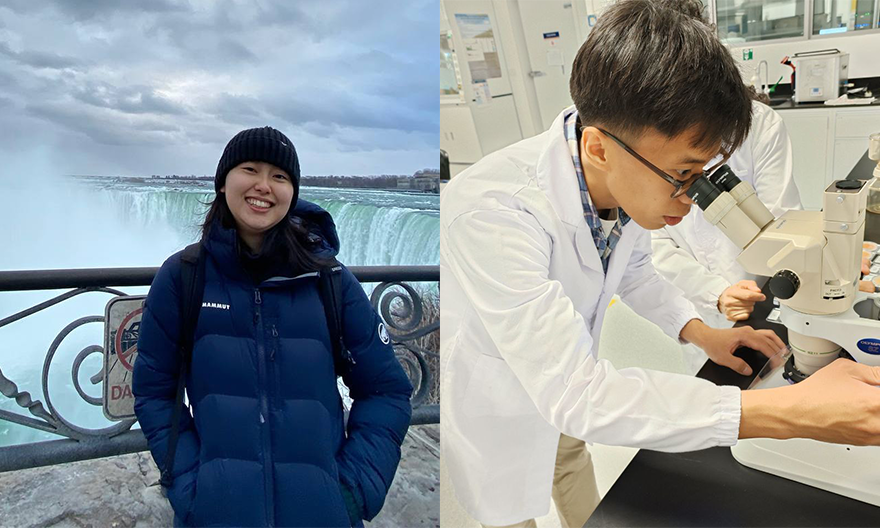Yale-NUS students pursue research passions in independent projects
Students take on Independent Reading and Research projects — a unique feature of the Yale-NUS curriculum — to explore interests beyond the curriculum
 Yale-NUS students Rinko Kawamoto and Stanley Tan (both from the Class of 2024) took on Independent Reading and Research (IRR) projects last semester to delve deeper into their research interests in magical realism and soil science, respectively.
Yale-NUS students Rinko Kawamoto and Stanley Tan (both from the Class of 2024) took on Independent Reading and Research (IRR) projects last semester to delve deeper into their research interests in magical realism and soil science, respectively.
The small and intimate setting at Yale-NUS College allows students to receive a high-quality education with much personal attention from their professors. The Independent Reading and Research (IRR) project – an innovation of the College curriculum – is an example of how students can benefit from close mentorship from a faculty member on an area of interest over a semester-long independent research project.
Last semester, Rinko Kawamoto (Class of 2024), worked on an IRR project on magical realism, a literary genre that blurs the lines between realistic descriptions of the world and elements of magic, the project stemmed from a longstanding passion. “I really appreciated the lush prose, the non-linearity of narrative, and the sociopolitical topics that these texts often address, and feel strongly about pursuing this genre academically,” she said.
“When I couldn’t find any fitting classes, I reached out to Associate Professor of Humanities (Literature) Geoffrey Baker, whom I know is an expert in this area. Thankfully, he agreed to supervise me!”
Meanwhile, Stanley Tan (Class of 2024) decided to pursue a project in soil science because of its salience to a world increasingly concerned with sustainability. His research focused on how environmental conditions interact with land use patterns to influence the amount of carbon in soil. Stanley explained, “Soil carbon is estimated to be an extremely large carbon pool and how we manage our soils in our forests and agricultural lands will affect our ability to mitigate climate change.”
Both students pointed to Yale-NUS’ extensive preparation for such extended academic endeavours. While Rinko, an Environmental Studies major, found the Common Curriculum helpful in widening her perspective on subject areas beyond her major, Stanley credited other research opportunities already available at the College as a steadfast foundation for the skills and knowledge needed in his project. During a term break in his first year of college, Stanley worked with Associate Professor for Science (Environmental Sciences) Michel van Bruegel to study mangrove forest regeneration in Singapore.
“Besides conducting field work at Pulau Ubin, I also reviewed relevant scientific literature on mangrove restoration. That experience has been particularly useful!”
However, nothing quite matches the freedom an independently directed project affords. For Rinko, the individual format of the project “has been extremely helpful” because she can tailor the structure of the IRR to her interests. The flexibility of independent study, for example, has allowed her to weave between classical works of Latin American magical realism and newer works that demonstrate the evolution of the genre.
“Being able to have input on the reading list has been extremely exciting,” she shared, “Reading One Hundred Years of Solitude has to be my most memorable moment—there is never a dull second when I’m reading that book!”
Yale-NUS College’s close partnership with the National University of Singapore (NUS) also means Stanley can work with the specialised resources of a large research university. Partnering with Assistant Professor Massimo Lupascu from the NUS Geography Department, Stanley was able to learn and apply diverse techniques of soil carbon measurement in real life settings with the NUS GeoLab, an experience he described as “extremely rewarding.”
“The team at the lab has been very patient and supportive!” he enthused.
No matter which direction their research took, both students found the experience deeply satisfying. Stanley found the hands-on work of conducting scientific research invaluable sharing that it taught him the need to stay focused in research. Meanwhile, Rinko’s project evolved into more than literature; the texts she chose also became a window into Latin American history. “One of my biggest takeaways has been understanding how the use of magic can help contextualise history in a more human way,” she explained. When asked about advice for future students contemplating independent projects, then, her answer was simple.
“Do it! There’s never a better way to delve headfirst into a new topic. With the IRR— you get the time, resources, and support to help you navigate it as well.”





